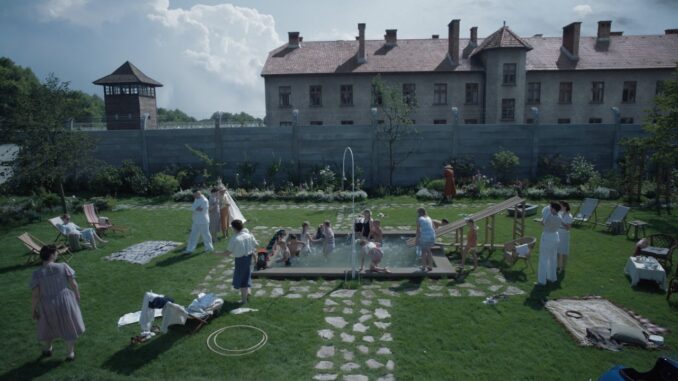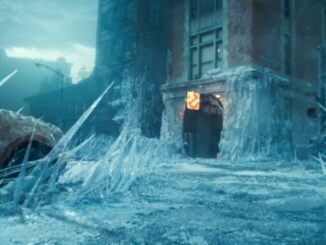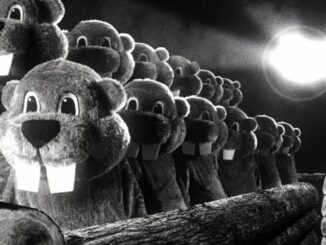
Roger Ebert famously said that movies were machines that generated empathy. Jonathan Glazer’s The Zone of Interest feels like the exception to that rule. It’s a movie that spends its entire runtime watching a family go about their mundane lives as horrible suffering plays out in the background; the longer it goes on, the less we can comprehend it.
Based on a novel by Martin Amis, Glazer’s film observes the daily life of Rudolf Hoss; his wife, Hedwig; and their children. It’s 1943 and Hoss is the Commandant of the Auschwitz prison camp. The film follows Rudolf and Hedwig as they go about their routines – gardening, celebrating birthdays, entertaining guests – oblivious to the cries of suffering behind their gate.
Maybe “oblivious” isn’t the right word. That would imply that they are aloof or unaware, innocently going about their business ignorant of government-sanctioned murder in their own backyard. But Glazer makes sure we know that’s not the case. Hedwig happily pilfers the clothing, jewelry and other accessories from the camp’s prisoners; at one point, she coldly tells the house’s Jewish servant that she could easily order her death. Rudolf becomes obsessed with efficient murder, designing a quicker way to kill more prisoners; in a chilling scene near the end, he calmly leaves a gathering of fellow soldiers to observe the ballroom from a balcony – he confesses over the phone to Hedwig that he was thinking of the most efficient way to gas them all.
And yet, these chilling glimpses into their psyches are not the film’s most horrifying aspects. Rather, it’s the way they go about what would otherwise be a normal life. To Rudolf, heading to Auschwitz is just another day at the office. And despite the mass murder happening just feet away, Hewdig focuses on turning their Auschwitz cottage into a dream home, proudly showing her mother the gardens and pool she’s helped furnish – and all the while, the screams, gunshots and smoke rise in the background.
It’s probably clear by now that The Zone of Interest is not a recommendation for date night or a casual Friday watch. Despite the fact that we never once see inside Auschwitz, it’s one of the most agonizing and horrific Holocaust films I’ve seen. The sound design crafts an aural nightmare as we hear soldiers bark orders and fire warning shots, and as the camp machinery rumbles and spits fire and ash into the night. It’s not just that the sound forces us to imagine what’s going on in the background; it’s that the way the Hoss family goes about their lives, not troubled by what they know is being carried out just steps away, adds a new element to the horror. Many films would try to find a way to give the characters a twinge of conscience or some self-awareness; aside from a chilling sequence in which Rudolf dry heaves in a stairwell – an homage to the documentary The Act of Killing? – there’s very little of that here.
After our press screening, a group of us stood in the theater lobby talking about the film. A fellow critic wished they could come up with a better explanation for the film’s themes than “the banality of evil.” I don’t know that one is needed; if ever a film was focused on that particular theme, it’s The Zone of Interest.
Glazer doesn’t work often – his last film was Under the Skin a decade back and his film previous to that was Birth, way back in 2004 – and his work isn’t always the most accessible. The Zone of Interest does not attempt to delve deep into its characters emotional lives, although both Christian Friedel and Sandra Huller (who gave the best performance of last year in Anatomy of a Fall) are effective at creating characters whose monstrosity doesn’t fully hide their humanity. Hedwig and Rudolf have affection for each other and their family; they love their home and, in fact, protest when Rudolf’s superiors try to transfer him from Auschwitz. But that humanity, juxtaposed with the constant reminders of what’s happening in the background, makes their evil more repellent and horrific.
Glazer doesn’t tip his hand too much. The camerawork isn’t flashy and the film focuses largely on the mundane aspects of the Hosses’ life. The chilling sound design carries most of the horror, with the sounds of Auschwitz in the background nearly the entire time, a constant rumbling, churning soundtrack of hell just beyond the gates of this family’s dream home. But there are visual flourishes to break up the oppressive bleakness. Glazer uses infrared photography to capture small acts of defiance or hope from the Jewish servants the family employs. At other times, the film cuts to black or red for several minutes as Mica Levi’s score bellows out, as if the movie is so consumed by the evil on display that it has to stop and scream.
It’s not an easy watch, but it’s an important one. The film is a vital and a sobering reminder of real-life evil; a montage at the end juxtaposing the locations during the film with their present-day state is a sobering reminder of its impact. But it’s a mistake to only look at it and then walk away shaking our heads at the evil the Nazis perpetrated, as if we are innocent.
I opened this review by saying the film, at times, felt like a work of anti-empathy, as the longer the Hoss family goes unconcerned with the atrocities, the more monstrous they appear. But while empathy is hard, recognition is vital. Because we play the same role when we indulge in our creature comforts without thinking about the suffering on our streets, in our community or around the world. What The Zone of Interest reminds us is that any of us are capable of excusing – or possibly even endorsing – great suffering simply because we’re too distracted and in love with the life we think we deserve.
This is one of the best films of 2023.



